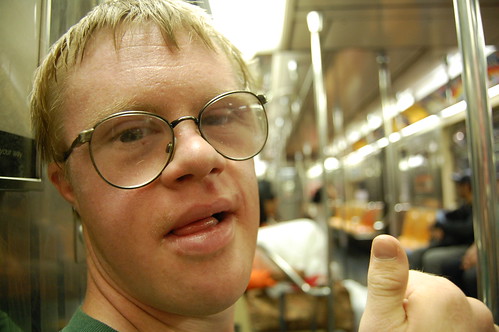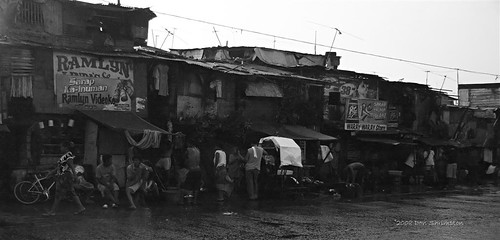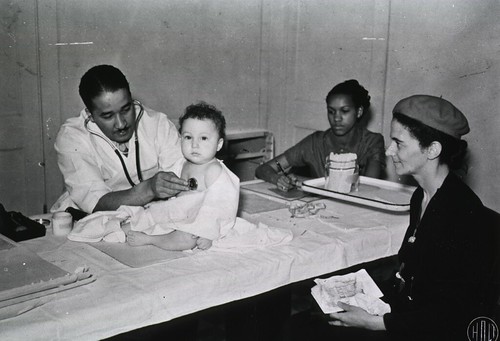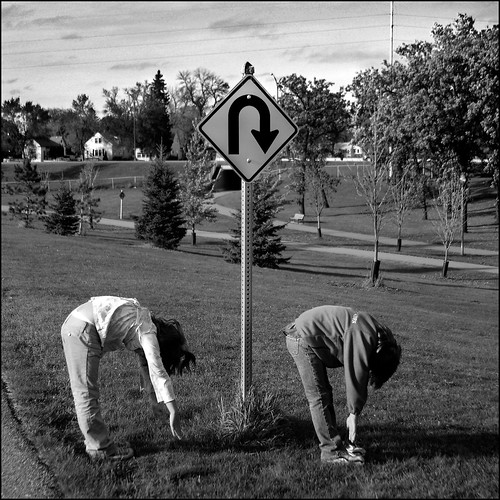Feast of the Holy Family
Picture: cc Jeremy Jenum
Sisters and brothers, the story is told of a man who enjoyed his wife’s cooking so much that he decided to ask her to teach him how to cook his favourite dish. Her delicious pot roast. The recipe was simple enough to learn. But, as he was learning it, he discovered a rather curious thing. He noticed that his wife always cut off both ends of the meat before putting it into the oven. When he asked her the reason why, she simply said that that was the way her mother taught her to do it. Not satisfied with her answer, the man decided to phone his mother-in-law to ask her. But her answer was the same. That was the way my mother taught me to do it. Thankfully, the wife’s grandmother was still alive. So the man went to ask her. When she heard the question, the grandmother laughed. We only had one roasting pan at the time, she said. And it was too small to fit the whole piece of meat. So I cut off both ends. That’s the only reason why…
One lesson I think we can learn from this story, sisters and brothers, is that sometimes knowing why we do something is at least as important as knowing how to do it. The why can motivate us. Energise us. It can even free us to make changes to the how, if necessary. To improve it. Without, of course, changing the quality of the outcome. The goodness of the pot roast.
I mention this because I think this lesson about the importance of the question why can help us to enter more deeply into the feast we are celebrating today. The Feast of the Holy Family of Jesus, Mary and Joseph. Today, as our opening prayer reminds us, not only are we celebrating the holiness of Jesus’ immediate earthly family, we are also asking God for the grace to imitate them. To learn and to follow their recipe for holiness. And our readings help us to do this by telling us how.
The recipe is actually simple enough. Simple enough to understand. If not to put into practice. It has to do with how we treat one another. So, in the first reading, children are encouraged to treat their parents with respect and honour. Even, and especially, when parents may have grown frail with age. Even if a father’s mind should fail, a son should continue to support him. Should not despise him. And, the second reading goes on to remind wives to give way to your husbands. Husbands to love your wives and treat them with gentleness. Children to obey your parents. And parents to never drive your children to resentment. The reading even broadens this recipe for holiness to include not just immediate family, but also the whole Christian community. Which includes, of course, our own parish family. You are God’s chosen race, his saints…. Bear with one another; forgive each other as soon as a quarrel begins…
Sisters and brothers, all of this is should actually come as no surprise to us. We all know what we have to do to imitate the Holy Family. We all know the recipe. The problem is that we often find it too difficult to follow. Too difficult to find the necessary motivation, the needed strength, to put it into practice. Which is why it is helpful to see that the question how is not the only question that our readings help us to answer. Just as important, our readings also invite us to consider the question why. Why should we imitate the Holy Family? Why should we treat one another with love and respect? With gentleness and compassion? If it’s really so difficult, why even bother?
The responsorial psalm answers this question quite simply. O blessed are those who fear the Lord and walk in his ways! If we treat one another well, as God wants us to, then we will enjoy God’s blessing. And the first reading describes this blessing in terms of specific earthly benefits. For example, whoever respects his father will be happy with children of his own.
The second reading, however, helps to broaden our understanding of God’s blessing. Why should we continue to try to treat one another lovingly? Even when it may be difficult? The answer is simply that when we do this, the peace of Christ will reign in our hearts. And the message of Christ, in all its richness, will find a home in us. This is the reason why we are called to holiness. Why we are called to love. And what an awesome reason it is. When we strive for holiness, by loving one another, we actually make a space for God. A place where God can be at home. In our hearts. In our lives. And in our world.
Isn’t this also the whole reason for the Holy Family’s existence? Isn’t this why it is so fitting that we should be celebrating the Feast of the Holy Family within the octave of Christmas? The holiness of the Holy Family has a very particular purpose. It enables God to make a home among us. Isn’t this what we find happening in the gospel? The reading begins with the Holy Family paying a visit to the Temple in Jerusalem. Which was where the Jews believed that God lived on earth. It was God’s home among God’s people. And when the baby Jesus is brought to the Temple, he immediately finds himself at home there. For in the Temple the baby is quickly recognised for who he really is. And what is home if not the place where we are recognised for who we really are? First Simeon, and then Anna, recognise Jesus as the Christ of the Lord. The fulfilment of God’s promise of salvation. In the helpless baby, the holy man and the holy woman recognise the powerful arm of God. Stretching out to save God’s people.
But that’s not all. We’re told that, after Jesus is consecrated in the Temple in Jerusalem, his parents bring him back to Nazareth in Galilee. And there, the Son of God finds yet another home. For we are told that, in Nazareth, under the watchful care of Mary and Joseph, Jesus grew to maturity, and he was filled with wisdom; and God’s favour was with him. Through the efforts of his holy mother, and his holy father, the little child grows into the holy person he is meant to become. A blessing to the whole world. Reconciling the whole of Creation with its Creator.
Here, sisters and brothers, we find the reason why the Holy Family is called to holiness. It is so that God will be able to bless them by making a home among them. And, through them, to bless the world. And isn’t this also why we too are all called to be holy? To love one another? Not just our immediate family members, but also our extended family? The family of the Church? Even the whole human family? We imitate the Holy Family, so that God will continue to find and to make a home in us. So that Christ will continue to grow to maturity in our midst. So that God’s presence will be seen and felt among us. A presence that brings justice and peace. Reconciliation and healing. Courage and joy. Not just to us. But also, through us, to the rest of the waiting world.
Sisters and brothers, someone once said that he who has a why to live for, can bear almost any how. On this Feast of the Holy Family, our readings give us both the how and the why. Both a recipe for holiness and a reason for putting it into practice. What will we do to follow this recipe more closely today?
One lesson I think we can learn from this story, sisters and brothers, is that sometimes knowing why we do something is at least as important as knowing how to do it. The why can motivate us. Energise us. It can even free us to make changes to the how, if necessary. To improve it. Without, of course, changing the quality of the outcome. The goodness of the pot roast.
I mention this because I think this lesson about the importance of the question why can help us to enter more deeply into the feast we are celebrating today. The Feast of the Holy Family of Jesus, Mary and Joseph. Today, as our opening prayer reminds us, not only are we celebrating the holiness of Jesus’ immediate earthly family, we are also asking God for the grace to imitate them. To learn and to follow their recipe for holiness. And our readings help us to do this by telling us how.
The recipe is actually simple enough. Simple enough to understand. If not to put into practice. It has to do with how we treat one another. So, in the first reading, children are encouraged to treat their parents with respect and honour. Even, and especially, when parents may have grown frail with age. Even if a father’s mind should fail, a son should continue to support him. Should not despise him. And, the second reading goes on to remind wives to give way to your husbands. Husbands to love your wives and treat them with gentleness. Children to obey your parents. And parents to never drive your children to resentment. The reading even broadens this recipe for holiness to include not just immediate family, but also the whole Christian community. Which includes, of course, our own parish family. You are God’s chosen race, his saints…. Bear with one another; forgive each other as soon as a quarrel begins…
Sisters and brothers, all of this is should actually come as no surprise to us. We all know what we have to do to imitate the Holy Family. We all know the recipe. The problem is that we often find it too difficult to follow. Too difficult to find the necessary motivation, the needed strength, to put it into practice. Which is why it is helpful to see that the question how is not the only question that our readings help us to answer. Just as important, our readings also invite us to consider the question why. Why should we imitate the Holy Family? Why should we treat one another with love and respect? With gentleness and compassion? If it’s really so difficult, why even bother?
The responsorial psalm answers this question quite simply. O blessed are those who fear the Lord and walk in his ways! If we treat one another well, as God wants us to, then we will enjoy God’s blessing. And the first reading describes this blessing in terms of specific earthly benefits. For example, whoever respects his father will be happy with children of his own.
The second reading, however, helps to broaden our understanding of God’s blessing. Why should we continue to try to treat one another lovingly? Even when it may be difficult? The answer is simply that when we do this, the peace of Christ will reign in our hearts. And the message of Christ, in all its richness, will find a home in us. This is the reason why we are called to holiness. Why we are called to love. And what an awesome reason it is. When we strive for holiness, by loving one another, we actually make a space for God. A place where God can be at home. In our hearts. In our lives. And in our world.
Isn’t this also the whole reason for the Holy Family’s existence? Isn’t this why it is so fitting that we should be celebrating the Feast of the Holy Family within the octave of Christmas? The holiness of the Holy Family has a very particular purpose. It enables God to make a home among us. Isn’t this what we find happening in the gospel? The reading begins with the Holy Family paying a visit to the Temple in Jerusalem. Which was where the Jews believed that God lived on earth. It was God’s home among God’s people. And when the baby Jesus is brought to the Temple, he immediately finds himself at home there. For in the Temple the baby is quickly recognised for who he really is. And what is home if not the place where we are recognised for who we really are? First Simeon, and then Anna, recognise Jesus as the Christ of the Lord. The fulfilment of God’s promise of salvation. In the helpless baby, the holy man and the holy woman recognise the powerful arm of God. Stretching out to save God’s people.
But that’s not all. We’re told that, after Jesus is consecrated in the Temple in Jerusalem, his parents bring him back to Nazareth in Galilee. And there, the Son of God finds yet another home. For we are told that, in Nazareth, under the watchful care of Mary and Joseph, Jesus grew to maturity, and he was filled with wisdom; and God’s favour was with him. Through the efforts of his holy mother, and his holy father, the little child grows into the holy person he is meant to become. A blessing to the whole world. Reconciling the whole of Creation with its Creator.
Here, sisters and brothers, we find the reason why the Holy Family is called to holiness. It is so that God will be able to bless them by making a home among them. And, through them, to bless the world. And isn’t this also why we too are all called to be holy? To love one another? Not just our immediate family members, but also our extended family? The family of the Church? Even the whole human family? We imitate the Holy Family, so that God will continue to find and to make a home in us. So that Christ will continue to grow to maturity in our midst. So that God’s presence will be seen and felt among us. A presence that brings justice and peace. Reconciliation and healing. Courage and joy. Not just to us. But also, through us, to the rest of the waiting world.
Sisters and brothers, someone once said that he who has a why to live for, can bear almost any how. On this Feast of the Holy Family, our readings give us both the how and the why. Both a recipe for holiness and a reason for putting it into practice. What will we do to follow this recipe more closely today?









